Tajik Prime Minister Rasulzoda Delivers a Speech at the 74th Session of the UN General Assembly
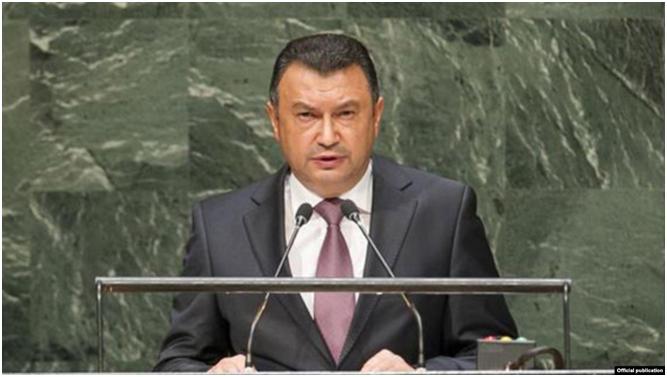
DUSHANBE, 28.09.2019 (NIAT Khovar) – Yesterday, the Prime Minister of Tajikistan Qohir Rasulzoda delivered a speech at the UN General Assembly. In his speech, Rasulzoda touched upon the problems of terrorism, organized crime and illicit drug trafficking.
Rasulzoda spoke about the efforts to ensure stability in Afghanistan and spoke about the effects of climate change on Tajikistan and Central Asia as a whole, in particular, about the rising temperatures, the rapid melting of glaciers and the increasing frequency of natural disasters. He also noted his support for the development of hydropower.
Terrorism, extremism and drug trafficking are threats to Tajikistan’s security
“Terrorism and extremism, along with transnational organized crime and drug trafficking, undermine international peace and security, aggravate conflicts and destabilize entire regions,” emphasized Rasulzoda.
“The country’s authorities are doing everything possible to fight terrorism and believe that the main efforts should be focused on eliminating the military infrastructure of international terrorism, depriving terrorists of any political, military and financial support, preventing the use of the internet for ‘radicalizing consciousness,’ recruiting and propaganda of extremism and violence,” said Rasulzoda.
While noting the illegal drug trade as one of the main sources of financing terrorism, Rasulzoda spoke about the initiative of his president to create a special group consisting of representatives of law enforcement agencies of the countries of the so-called ‘northern route’. It will work with the support of the UN with the involvement of experts to study the problem of drug trafficking.
Rasulzoda called for support of this initiative at the UN.
The security of Central Asian countries is closely linked to the situation in Afghanistan
Rasulzoda stated that the security of Central Asian countries is closely linked with ensuring stability in the neighboring Afghanistan.
“Tajikistan, as the country with the longest border with Afghanistan, since the first days of its independence has been putting continuous effort to promote the establishment of lasting peace and stability in our friendly country,” said Rasulzoda.
Rasulzoda also spoke about the projects in the socio-economic sphere relating to the development of the ‘transport artery of two countries,’including Tajikistan and Afghanistan with the creation of‘energy bridges’ and the provision of electricity to the Afghan population.
The area of glaciers has been significantly reduced in Tajikistan over the past decade
Rasulzoda focused on the problem of climate change, emphasizing that over the past 60 years, the average annual air temperature in Tajikistan has increased by one degree Celsius. In addition, the number of days with heavy rainfall increased along with the frequency and intensity of natural hydrometeorological phenomena.
“Only due to natural disasters relating to water, hundreds of millions of dollars of damage are caused to the economy of our country every year. Natural disasters are often accompanied by human casualties. The negative impact of climate change on the quantity and quality of freshwater resources in the world is becoming increasingly apparent,”said Rasulzoda.
According to him, over the past decade, a significant reduction in the area of glaciers has been recorded in Tajikistan, which is vital for the whole of Central Asia.
“In this regard, we consider it necessary to strengthen cooperation between countries in the aftermath of natural disasters through the development of preventive measures and the creation of appropriate funds to assist countries in need. It is also necessary to strengthen monitoring of glaciers, snow and other water sources and take effective measures to protect them for future generations,” Rasulzoda urged.
Tajikistan — for the widespread use of hydropower
According to him, it is necessary to fully encourage the development of the green economy, in particular green energy, as an important vector of sustainable development.
“The widespread use of renewable energy, mainly hydropower, contributes to the economic and social development of the country with the lowest levels of harmful emissions into the atmosphere. The country’s energy sector is based on hydroelectric power plants, which generate about 98% of electricity,” Rasulzoda said.
He added that the country’s government is taking comprehensive measures to balance energy production and consumption by modernizing and increasing the capacity of existing hydropower plants, building new hydropower plants, and introducing modern methods of energy conservation.










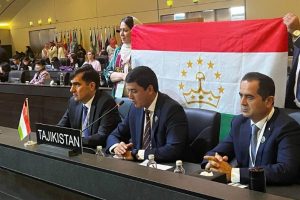 Tugay Forests of the Tigrovaya Balka Nature Reserve Included in the UNESCO World Heritage List
Tugay Forests of the Tigrovaya Balka Nature Reserve Included in the UNESCO World Heritage List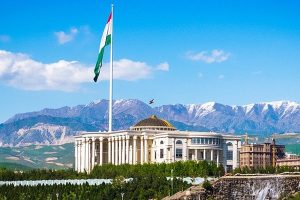 TAJIKISTAN IS TAKING SUSTAINABLE STEPS TO PROVIDE THE RIGHTS AND FREEDOMS OF HUMAN AND CITIZEN. In the light of the adoption of the National Strategy of Tajikistan in the field of human rights protection for the period up to 2038
TAJIKISTAN IS TAKING SUSTAINABLE STEPS TO PROVIDE THE RIGHTS AND FREEDOMS OF HUMAN AND CITIZEN. In the light of the adoption of the National Strategy of Tajikistan in the field of human rights protection for the period up to 2038 Buta Airways Carries First Baku — Dushanbe Flight
Buta Airways Carries First Baku — Dushanbe Flight President of Tajikistan Sends Humanitarian Aid to Earthquake Affected People in Syria
President of Tajikistan Sends Humanitarian Aid to Earthquake Affected People in Syria President Sends Aid to Families Affected by the Natural Disaster in the Gorno-Badakhshan Autonomous Region
President Sends Aid to Families Affected by the Natural Disaster in the Gorno-Badakhshan Autonomous Region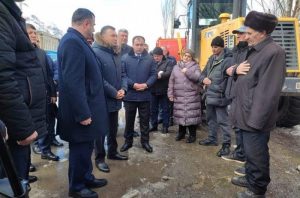 Prime Minister Rasulzoda Visits Khorug
Prime Minister Rasulzoda Visits Khorug IRS: The Consequences of Avalanches Have Been Eliminated on the Dushanbe-Chanak Highway and Traffic Has Been Provided
IRS: The Consequences of Avalanches Have Been Eliminated on the Dushanbe-Chanak Highway and Traffic Has Been Provided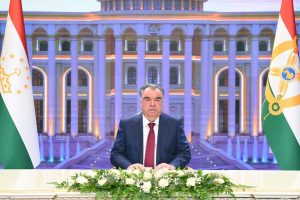 President Emomali Rahmon Calls 2022 Another Historic Year for Tajikistan
President Emomali Rahmon Calls 2022 Another Historic Year for Tajikistan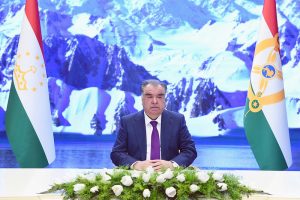 UNGA Supports President Rahmon’s Initiative to Declare 2025 as the International Year of Glacier Protection
UNGA Supports President Rahmon’s Initiative to Declare 2025 as the International Year of Glacier Protection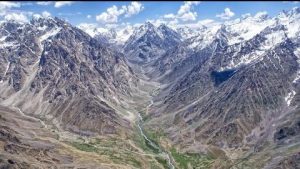 GEOLOGIST’S DAY. How Rich Is Tajikistan and Why Is It Important to Develop Geology in the Modern World?
GEOLOGIST’S DAY. How Rich Is Tajikistan and Why Is It Important to Develop Geology in the Modern World? Kazakhstan Plans to Open a New Flight to Dushanbe in 2023
Kazakhstan Plans to Open a New Flight to Dushanbe in 2023 Jazeera Airways Will Connect Kuwait with Tajikistan
Jazeera Airways Will Connect Kuwait with Tajikistan













